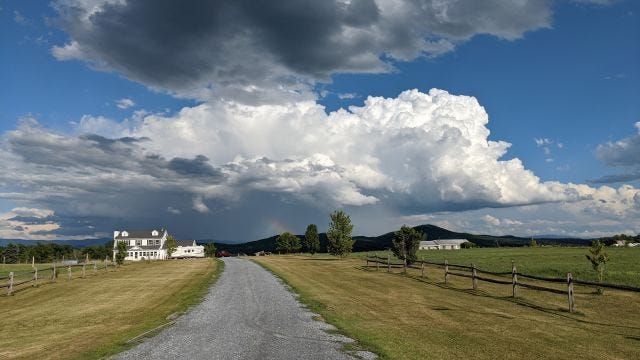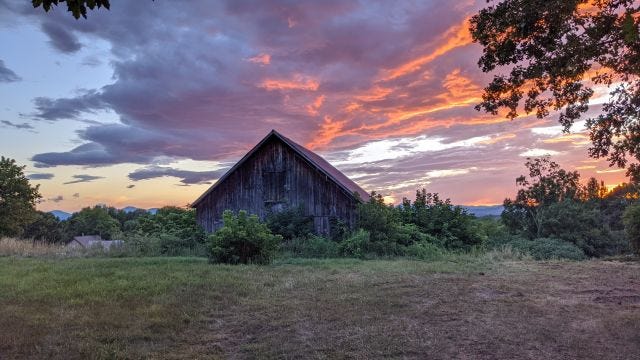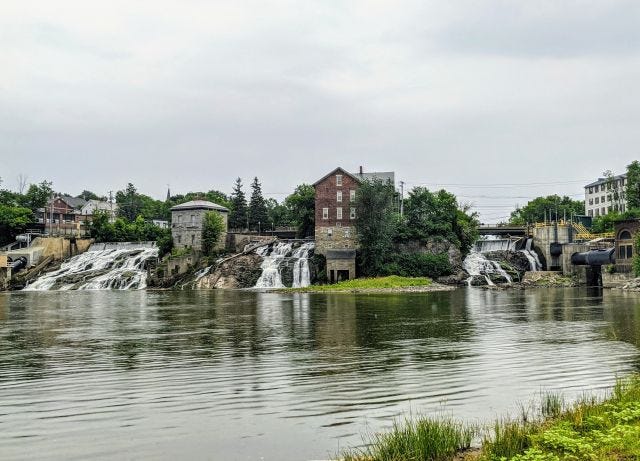Charlotte
Hi there! This essay has many beautiful photos of Vermont. Please go to the Thacher Report essay to see them all. I also recorded this as a podcast (with music!) available on Apple, Spotify and Podbean. I'm grateful for your interest and encourage you to please share this with others.

A promise to the East. Addison County, Vermont. July 2020
Charlotte
by Zachary Thacher August 2020 — Charlotte, Vermont
After leaving Concord, Massachusetts in early July I moved into the rear apartment of a rambling farmhouse in Charlotte, Vermont — which redounds with memories from my old rear apartment in Stanford, California. My friend, his wife along with their two little girls recently Covid-purchased an 1830s white house with green shutters. Behind the house are barns and out-buildings in various stages of completion on a five acre parcel, with forty further acres behind it. Imagine a quirky arts college with a passion for painting buildings Pantone #1810 and you’ll get the idea. A couple who are close friends of theirs are now about to transform the calf barn by the office building into a human home where they will live after also fleeing New York. If this is more an elegant immigration camp than a college campus that’s fine with me; the point remains the same. Like I wrote earlier, Jesse and his wife steward more of a village than a family.
I’m just glad to belong. It’s been a month so far. I figure it might be another month. Or longer. Jesse texts me listings for places nearby so I could live here forever. Covid has a way of elongating plans while the rest of the country burns in a viral orgy of Republican propaganda and sickness. Staying far away in a Deep Blue state dedicated to science and mask wearing is literally the safest place to be right now. All the Black Lives Matter signs extend the welcome.
We’re in Charlotte, pronounced shar-LOT, after King George III’s German wife Charlotte Mecklenburg-Strelitz, which sounds obscure, but not when you’re living with people who decant and imbibe Lin-Manuel Miranda’s “Hamilton” with the avidity of oenological drunks. What worries me is that now I’m drinking the Miranda too.
You say our love is draining and you can’t go on
You’ll be the one complaining when I am gone
And no, don’t change the subject
Cuz you’re my favorite subject…
— King George III in Hamilton’s “You’ll Be Back”
Jonathon Groff as King George III. Charlotte Mecklenburg-Strelitz stars in the sequel. Fingers crossed.
Charlotte (work with me here: shar-LOT ) is a rural, well-heeled community with truly working and embarrassingly gentleman farms, big homes on huge parcels — some on private Lake Champlain beaches and some with dramatic views of the Adirondacks, or both. There’s a country store that’s open from 8am - 3pm. It seems like a good place to schmooze with neighbors, but you can’t go inside because of Covid. When you stand on the porch and order food at the window you wear a mask, as does the teenage girl who serves you. As do the few people waiting patiently behind you.
Like I said, it’s math. It hasn’t changed since March.
Rural + Democratic = Safe
Charlotte is as quiet as a corn field, and also less than thirty minutes from a city with all the stores and hospitals and services you’ll ever need, including an airport. And in the Before Times, it’s a two hour drive to what you’d swear is France in a freezer.
Note that Canada and France have mostly tamed Covid. They both lack anti-science pro-poverty Republicans. Coincidence?
To all the geeky folk who like thinking about human habitation, the Burlington metro area — the municipalities of Burlington, Winooski, South Burlington and their semi-rural suburbs — holds a quarter million people. In a state of 600,000, that means forty percent of all Vermonters live in or near Burlington.
Charlotte is juuuuust far enough away from all that if you don’t like maps and do like walks, you’d swear you were a million miles from anywhere. We sleep with our doors unlocked. There is no traffic. The most exciting event in the past week happened when Jesse, Kyra and I were talking in the kitchen after they had put the girls to bed.
The lights were low, we murmured about a popular Broadway musical featuring a founding father when our eyes stopped working. If color was a sound it’d go “whoosh.” Blackness covered us like a blanket on a bird cage. We were blind. It was black and silent and unreal.
Power outage.
Right. We got this.
We lit up cell phone flashlights and I checked my battery life. It was 90% because I’m always prepared. I worried about it running out because I’m always Jewish.
Candles, find the candles.
Then neighbor Nancy texted. Someone broke into her house. Right now. An intruder. She called the police. Our Vermont idyll shattered. No longer charmingly neurotic, we’re in actual danger. A break in? Next door?
We locked the four doors on the first floor of the enormous house. Closed the dozen windows. Kyra leapt upstairs to check the girls. I went to my room and found the two items I had packed from my West Village apartment that I always thought were nuisances I carried from place to place for no reason. Now they became necessities. A lighter and a very sharp folding knife.
Jesse would keep his calm going over Niagara Falls in an inner tube and also testifying before Congress, but I girded for battle.
Kyra soon came downstairs. We lit candles with my lighter. We waited and listened. Nothing.
What the hell.
I felt my knife in my pocket, turned on my phone’s flashlight and left the safety of the house to check on our neighbor.
It was deep space dark on the rural lane.
I walked a hundred yards south. The last time I got into a fight I was seven years old and was sent to the principals office, but I kept going. I’m 5’7" and 150lbs., not exactly bouncer material but I hear wolverines rip up caribou.
The neighbor saw my flashlight. She met me at her porch. I was ready to tear the head off anything anywhere.
“I’m a little embarrassed but my roomba vacuum was banging on a closet door. The power outage must have triggered it. Police swept the house and it’s fine.”
Apparently Charlotte criminals are clean freaks and not stealthy. And also, not criminals.
I shut off my flashlight to let out the wolverine and bring back the hippie. I walked down the black road. Fireflies floated over a meadow like a silent, floating curtain of bioluminescence. That’s rad.
Lake Champlain frames Charlotte’s west and the semi-farmy, semi-suburban Shelburne borders the north.
And… that’s all folks! Head east or south and you’ll drift into farmlands that eventually make up their mind to lead you to the small towns of Hinesburg and Ferrisburgh, or they meander into dirt roads leading to pasture and forest. It’s hard to tell where Charlotte ends and they begin. Think meadows studded with cows the color of wet velvet, views of slate mountains, clouds furling in an azure sky. Borders and names on maps seem pointless against all this beauty. You stop checking your map. You look and feel the peace within you as you embrace nature’s cosmic haimische comfort. Turns out wolverines mostly live in comic books and boreal forests far to the north.
Here are a few photos to show you what you’ve been missing. Please go to the Thacher Report essay to them all. It's worth the click, especially if you're on a laptop.

Jesse's backyard, facing Mutton Hill
The problem with all this beauty is that too often it’s all mine. I explore, have jaunts in my car, meanwhile the host family, the village elders, stays home.
Because of Covid, because of comfort, because of children, because when you’ve worked so hard to own a home that’s big enough for your family and friends, you don’t want to leave it. I get it. I eat all my meals with them.
In the process of consuming 100% of your calories at home except for a rare jaunt to a pizza place — we’re decidedly no longer in a New York of “let’s go to dinner or maybe order Seamless ”— it turns out this family has found a way to break the rules of physics. It seems improbable but it repeats every night around 8pm. Three normal adults, now five with the calf barn couple, and two micro-sized humans who consume food in thirty minute intervals from the moment they wake until the moment they go down, create more dirty dishes and pots and pans pots than exist as clean. It’s a miracle in reverse.
What seems like a tidy pantry for plates and a few drawers for utensils somehow multiplies by nightfall into thousands and then millions of dirty items stacked on counter tops, tables, the sink, the half opened dishwasher, all the stove burners and even the floor by doll houses populated entirely by princesses in a kind of utopian feminist aristocracy.
One night while resolving this mess of outlaw physics, I told Jesse we should take a break to enjoy the sunset. He wasn’t reluctant, more like, preoccupied. But I didn’t have to ask twice. He shut the faucet and we stepped out the door.

The view a few doors down from my friend's house.
Energized by nature’s splendor, we polished the kitchen to a shine and bid each other good night.
Beyond rogue roombas and the finite-clean-dishes-to-infinite-dirty-dishes ratio, there are legitimate challenges to life in Vermont. Take running for example. There are way more hills here than the flatness of downtown Manhattan and also sweltering, shadeless heat plus humidity. Is this Dubai? What happened to autumnal New England? There are also so many views you have to stop and take pictures. Add to that top notch craft beer and farm stand berry pies and soon you’ll be able to rationalize the transcendent value of downshifting from athletic ambition to coasting into neutral... and just… enjoying life.

Pasture in Charlotte, looking southeast, while not running.
The other day, for the first time in a month that felt like a decade, we went off campus to drive to Waitsfield, in the Mad River Valley of the Green Mountains. In the Before Times the town attracted skiers to Mad River Glen and Sugarbush Mountain. Now it’s a place for locals to eat dinner outside.
We went to Lareau Farm, home of American Flatbread pizza. A nearly full moon rose over us. For all you Jews out there, Tish B’Av is over. Tu B’Av, our version of Valentine’s Day, comes soon. The lunar cycle is nearly half over.
Why the Gregorians couldn’t leverage the Jewish wisdom of a solar-corrected lunar calendar that’s unpolluted by Roman narcissism is beyond me, but I digress.
To add a few more views, I discovered a town south of us bigger than Charlotte. It’s Vergennes — named after a French count who assisted the American revolution maybe more in spite of the British than a love of its subjects, but who knows for sure? I’ll leave the drama to Lin-Manuel.
The Otter Creek forms falls that powered mills and now, my attention.

Vergennes, VT.
As a coda, recently I flaneured my way — via the Sapphire Dragon — to the hallucinatory beauty of Shelburne Farms. It’s the aristocratic playground cum tax shelter for Vanderbilts. It’s 3,800 acres designed by Frederick Law Olmstead that replicate heaven, but you get to be alive. Hard to imagine, right? Central Park is 840 acres. Prospect Park, the superior landscape, is 320 acres. This is ten times the size.
Here’s how to imagine Shelburne Farms. Take Prospect Park. Take LSD. Listen to John Denver’s Rocky Mountain High on repeat. Drive a convertible. It’s like that.
Who am I kidding? We’re way too old for that. Just scroll. Or better yet, come up here and see for yourself.

Beach at Shelburne Farms
I know I’m repeating myself with the extensive analogies, but please endure one last list. To imagine Vermont in summertime, picture Montana’s Big Sky, listen to Janis Joplin, think of laid back yet conscientious Northern California, add in dairy farms, embrace the progressive politics of, well, Vermont and down a pint of New England style IPA. That’s what it’s like here. Just more so.
Winter is coming. Soon we’ll be North of the Wall in a land of wildlings with bad teeth and flexible ideas about commitment, but at the same time, cold seems impossible when it’s as hot and sticky as a night club and when you’re heading home to eat dinner outside with your friends and their friends and the neighbor’s kid who survived the roomba nightmare. You sit at a table loaded with food, you tell stories to the children and you toast the chefs to thank them for their shelter and hospitality, and who in turn toast you to celebrate your attendance because now, at day’s end, the village is complete.
See way more photos at the Medium essay.
Thanks for reading! -- Zachary


